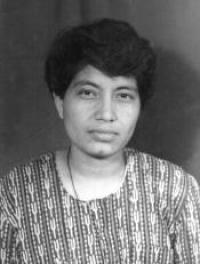A special phase: the beginnings of Mahila Samakhya in Tehri

A special phase: the beginings of Mahila Samakhya in Tehri
I belong to Tamiyar, a village in Uttarakhand’s difficult-to-reach mountainous district of Tehri. This remotely-located village does not offer even basic amenities for life. During my childhood, my family moved with my father to Old Tehri where I was able to complete my education. After having finished my MSc. Degree in Veterinary Sciences, I temporarily moved to the environment wing of the Tehri project and also worked as a lecturer. However, these did not satisfy me mentally and so I turned my life towards a different direction.
I started this new journey with INTACH’s Amar Gyan Series project that involved recording oral testimonies (autobiographical) of anonymous individuals. One of the self-narratives in this case studies project was that of Bachni Devi from Hevalghati.
This experience made me recognize that along with academic knowledge, it is the realities and ordeals of life that show us how to live a meaningful life in real terms. Therefore, I worked with S. M. Diwan, an Advisor to the World food Programme, in the villages of Ranichauri. Three years later, in 1994, I joined Mahila Samakhya in Tehri, a programme that was to give my grassroots experience a substantive impression.
Even after joining Mahila Samakhya, I did not possess a thorough understanding of women-oriented politics, gender discrimination and feminism. Till Jagori Documentation and Research Centre’s Founder and Mahila Samakhya’s Advisor, Abha Bhaiya and gender expert Kamla Bhasin facilitated a gender workshop; this gave me some clarity.
It was during this workshop that I actually understood that feminism and pro-women politics are not anti-men, but instead oppose all narrow and regressive values, injustice and exploitation that support structures of discrimination, unequal distribution and inequality. This was my first introduction to Jagori.
These ideas that I acquired from the workshop helped me a lot in forming my own understanding. This started a series of trips to Jagori, conversations with Abha di and Kamla di on the humanist connotations of feminisms, among others, and a process of learning that sustained for a long time.
Despite all these efforts, misconceptions, doubts and a sense of incompleteness continued to attack my confidence. During that time, a challenge confronted me in the form of a national document that had to be prepared for an international conference. Since I was not well-informed about the field, I expected some help from Jagori. But when I did not receive as much help from there, our team prepared a quantitative and qualitative process based account. This was a ‘turning point’ in my life.
To run Tehri’s Mahila Samkhya programme smoothly was a challenge for which Jagori supported me at every step. Jagori’s moving documentation and writing style left such a deep impression on me that I deployed it for the Bainyu ko Raibaar series wherein we published documents on issues associated with women’s lives such as health, law, traditional treatments, politics and feminist history. We used many dissemination tools such as posters, phad (a cloth/canvass scroll with illustrations), stickers, parcha (leaflets), songs, plays and poems to raise awareness and understanding on complex issues in local areas. Together with Jagori, workshops and trainings were conducted to enable women to develop a comprehensive understanding of issues.
Besides helping us as a Resource Centre, Jagori also motivated us and strengthened our work with regard to administration, facilitation and documentation. Jagori’s resource persons and trainers continued to inform and counsel us for the unique experiment of Tehri’s Bal Kendras (children’s centres) where instructors offered informal education.
I would like to credit Jagori’s team and especially Abha Bhaiya for the success of Tehri’s Mahila Samakhya programme; at every step, she would boost our morale and come to our location to mentor us. I feel proud to say that we could translate the programme on the grassroots beautifully, just as per our conceptualization of it. In the realization of the Mahila Samakhya dream, my strong team played a role too; in preparing this team and making in function on principles and with capabilities, Jagori’s collective and all the feminist experts and activists associated with played a leading role.
It is a matter of surprise that the responsibility of training and guidance of a government programme was handed over to Jagori, a feminist organisation. Despite the ups and downs in relations, it constantly stayed associated with Jagori; women’s attachment with Abha and Shanti, their wholehearted passion for Kamla’s songs that played on everyone’s tongue were the measures of feminist thought. Jagori’s decision to withdraw from Mahila Samkhaya created a dent in this understanding and the programme became only a government programme.
Thanks to Jagori and Sangat, I also attended an international gender and development workshop that sculpted my feminism and gave me the strength to work on the grassroots with sensitivity. The analytical learnings from the gender and development workshop were used in Tehri’s grassroots programmes such as ‘Sahara Sangh’, ‘Nari Adalat’ and ‘Barefoot Advocates’ so as to enable women cope with violence and empower them. I feel content that the foundations laid by our efforts in Mahila Samakhya are still intact. The Mahila Samooh (women’s collectives) created by Mahila Samakhya in villages are living documents that prove their meaningfulness as well as the significance of Jagori as the trainers’ groups. Jagori’s Kalyani Menon-Sen offered us a unique gift by enabling our team and women in the villages to view agriculture and food issues through a feminist lens.
As far as I am concerned, I credit Jagori’s training for my attempt towards looking for humanitarian solutions within political processes and equality-based strategies. I attribute the strong grounding of my work and the presence of empowered women to the constant support from Jagori and the encouragement from resource persons and friends who too were associated with Jagori. My loving salaam to all those friends at Jagori!



